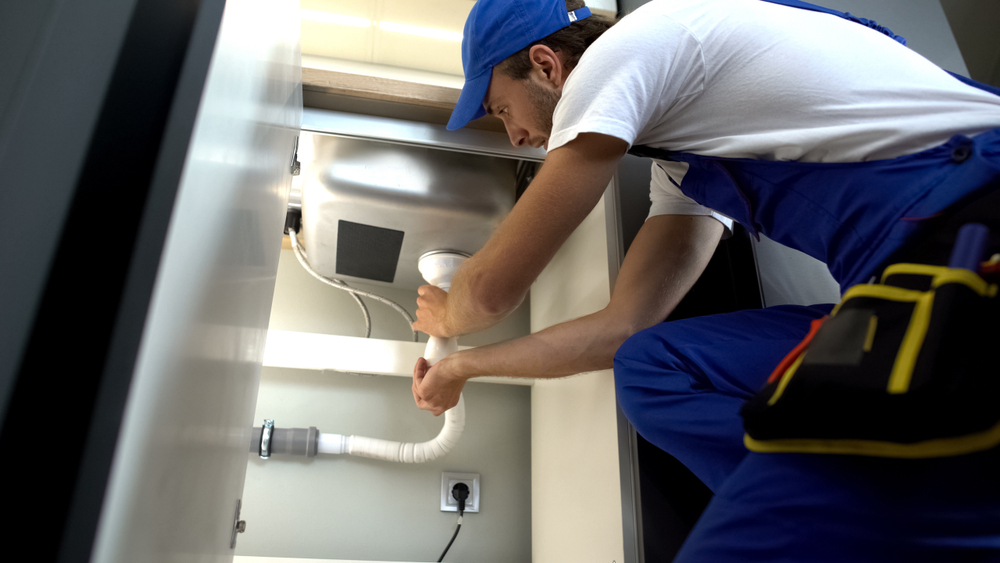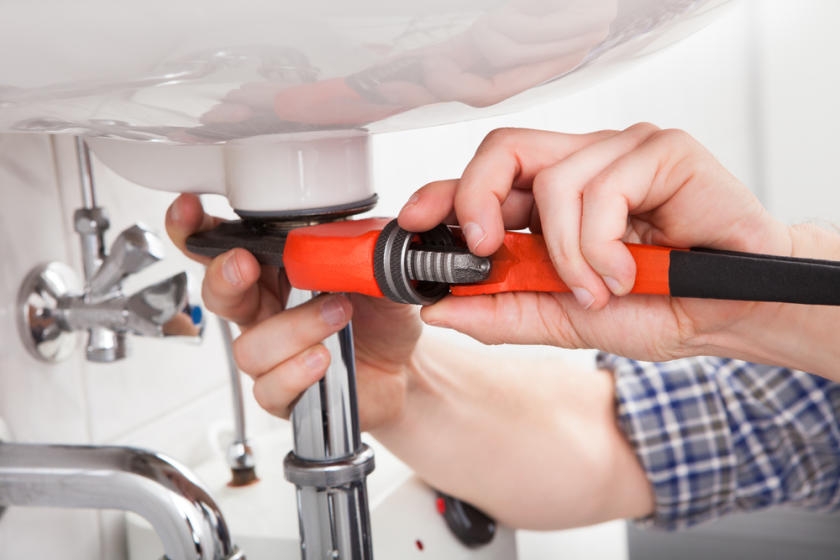The author is making several great pointers relating to Plumbing Emergencies: Tips on What To Do Before in general in this article underneath.

Pipes emergencies can strike at any time, triggering stress and anxiety and prospective damages to your home. Whether it's a ruptured pipeline, a blocked drain, or a dripping faucet, understanding just how to manage the situation until a specialist plumbing professional gets here can conserve you from more complications. This short article supplies crucial emergency plumbing suggestions to help you alleviate damages and regain control during a plumbing dilemma.
Shut off the Water System
The primary step in any type of plumbing emergency is to shut off the supply of water. For localized issues, such as a dripping tap or bathroom, shut off the valve near the fixture. In the case of a major leak or burst pipe, locate your home's major water shut-off shutoff and transform it off quickly. Recognizing the area of these shutoffs beforehand can save valuable time throughout an emergency situation.
Address Tiny Leaks with Temporary Fixes
Tiny leakages can swiftly end up being considerable issues if left unattended. Use these temporary solutions till expert help gets here:
- Pipe Tape or Epoxy Putty: Apply water-proof tape or epoxy putty to temporarily secure the leak.
- Rubber and Clamp Method: Cover an item of rubber or an old inner tube around the leak and secure it with a hose clamp or air duct tape.
- Containers or Towels: Location buckets under the leakage to consist of water and avoid damage to floor covering or furnishings.
- While these repairs aren't permanent, they can aid lessen water loss and damages.
Unclog Drains Pipes Safely
A clogged drainpipe can be a discouraging and messy problem. Here's just how to tackle it: - Utilize a Plunger: For sinks or commodes, a bettor can frequently displace small obstructions. Ensure you make use of the appropriate sort of plunger for the component.
- Hot Water and Meal Soap: For grease-related blockages, pour a mix of warm water and meal soap away to separate the grease.
- Avoid Chemical Drainpipe Cleaning company: While appealing, chemical cleansers can cause even more injury than great, specifically to older pipes.
- If these techniques do not work, prevent utilizing too much force, as it might get worse the blockage.
Handle Overflowing Toilets
An overruning toilet can trigger instant disorder. Here's what you must do: - Quit the Water Flow: Eliminate the container lid and press down on the flapper shutoff to quit water from entering the bowl. Switch off the water supply to the bathroom if essential.
- Plunge Carefully: Utilize a commode bettor to get rid of the blockage, however prevent aggressive plunging, which can trigger splashing or further damage.
- Contain the Spill: Usage towels or a wipe to tidy up water swiftly to avoid flooring damage.
Shut down Your Water Heater
In particular emergency situations, such as a ruptured pipeline, it's wise to shut down your hot water heater. This stops getting too hot or damage to the system when water quits flowing. Shut off the power supply to the hot water heater (electrical or gas) and let it cool off to stay clear of possible risks.
Briefly Quit a Ruptured Pipeline
A burst pipeline can result in substantial water damage in minutes. To minimize the concern:
- Clamp or Wrap the Pipe: Make use of a pipeline clamp, rubber, or air duct tape as a short-term seal.
- Draw Away Water Flow: Ideally, divert the water right into a pail or basin to restrict damage to bordering locations.
- Keep the Area Dry: Usage towels or a wet/dry vacuum to get rid of standing water.
- Call an expert plumbing right away to address the trouble permanently.
Handle Frozen Pipes Meticulously
In chillier climates, icy pipes are a common emergency situation. If you presume a frozen pipeline: - Shut off the Water: Shut off the major supply of water to stop a ruptured pipe.
- Defrost Slowly: Utilize a hairdryer, heating pad, or cozy towels to thaw the pipe progressively. Avoid open fires or severe heat, as these can harm the pipeline.
- Examine for Leaks: Once the pipeline is defrosted, check for splits or leakages before turning the water back on.
Avoid Further Damage
Taking fast activity to reduce damage can conserve you money and time over time. Below's exactly how:
- Move Valuables: Remove furniture, electronic devices, and various other products from the affected area.
- Use Sandbags: For flooding scenarios, location sandbags around the area to reroute water.
- Shut down Power: If water has actually gotten to electric outlets or appliances, switch off the power to stop shocks or fires.
. Have an Emergency Situation Pipes Set
Prepare a fundamental pipes emergency kit to handle minor concerns properly. Your kit should consist of:
- Flexible wrench
- Plumbing technician's tape
- Pipe clamps
- Towels and rags
- A bettor
- Epoxy putty
- Container.
- Having these tools accessible can make a substantial distinction in your capability to manage emergency situations.
Know When to Call a Specialist.
While quick fixes can assist temporarily, certain pipes problems require immediate specialist interest. Call a plumber if:. - A burst pipe causes substantial flooding.
- Drains or commodes remain blocked regardless of your efforts.
- You see consistent leakages or water pressure concerns.
- Your water heater is dripping or malfunctioning.
- Quickly calling a professional makes sure the issue is fixed properly and protects against further issues.
Conclusion.
Plumbing emergency situations can be overwhelming, however with the right expertise and tools, you can take care of the situation effectively up until aid arrives. By shutting off the water, dealing with little leakages, and using short-term solutions, you can reduce damage and maintain your home safe. Bear in mind, these tips are short-term remedies; constantly speak with an accredited plumbing to manage the origin of the problem. Prep work and fast thinking are your best allies in any type of pipes emergency situation.
8 Helpful Tips for Managing Plumbing Emergencies at Home
If your plumbing system hasn’t failed once, wait for it because almost everyone has a story to tell. Sometimes, it could be simple emergencies such as a leaking pipe, a blocked cistern, or even a big burst pipe. In situations like this, you need to have some handy tips to save you some money and from possible damages.
Take care of minor issues early.
Sometimes, you could have avoided an emergency by taking proactive measures while it was still early. Some major plumbing emergencies can be a result of an ignored minor issue. We recommend that you have items like plumbing tapes and other related items. A plumbing tape can allow you to manage minor leaks before the plumber arrives.
Cut off the water supply.
This tip is essential in almost any type of leakage problem. For problems like minor leakages in the toilet or kitchen, turn off the supply that takes water to the affected pipes. If the leakage is a major pipe, you must shut off the supply valve to the entire building. This will help you avoid flooding your home and neighbors if you share a flat.
Know your plumbing system
Folks typically move into a new apartment without understanding the water supply around the building. This can prove disastrous if a water emergency arises and the plumber is far away. The previous tip will prove useless if you don’t practice this one. More importantly, know where your water shut-off valve is located – you’ll need that knowledge to prevent potential home floods.
Have some common handy tools
There are lots of plumbing emergencies that you can handle without hiring a plumber. That’s why you must keep some tools available always. Some tools that you can use to fix simple plumbing emergencies easily include plumbing tapes, screwdrivers, thread seal tapes, plungers, pliers, tape measures, and rubber gloves.
Insulate your pipes from cold
You’ll save yourself from many plumbing expenses if you protect your water pipes from the cold. This is because of the harmful effects that cold weather can have on your pipes. During winter, your pipes can burst from being overly expected to freezing temperatures. So, make sure insulators are there to keep the pipes working correctly.
Avoid practices that will clog your toilet.
Many people indulge in practices that can damage the plumbing system of the entire building. One of these is when they use their toilet to dispose-off garbage. They flush all kinds of things, such as paper towels, bandages, hairs, female sanitary products, etc., down the toilet. This will block your toilet in the long run, incurring unnecessary expenditures. Dump such waste in the trash instead.
Check your dials regularly.
Sometimes, there could be leakages in your home without noticing them in time. So, constantly monitor your water meter dial. If the dial is reading when there is nobody using water, this is an indicator that there is leaking. Check for leaks immediately. Call a plumber as soon as possible if you can’t find any.
https://www.constructionplacements.com/8-helpful-tips-for-managing-plumbing-emergencies-at-home/

Do you enjoy more info about Plumbing Emergencies: Tips on What To Do Before? Try leaving feedback further down. We'd be delighted to see your opinions about this post. We hope that you come back again in the future. Enjoyed reading our content? Please share it. Let someone else find it. I praise you for your time. Come back soon.
Call
Comments on “Ways to Manage Urgent Pipe Problems with Temporary Solutions Until Help Arrives”